| Name |
Picture |
Toxicity |
Toxic Part of Plant |
Symptoms |
Time Period for Symptoms |
Additional Information |
| Castor Bean/Castor Oil Plant |
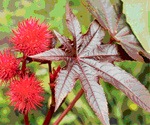 |
Extremely High |
The seeds of the plant are the most toxic part. |
Diarrhea, stomach irritation, abdominal pain, increased heart rate, convulsions, collapse, death |
Most symptoms appear within 18 to 24 hours after ingestion. Death typically occurs with 36 hours due to anaphylactic shock and stomach irritation |
Call vet immediately if your dog has ingested castor seeds. The plant is primarily found in Illinois, Missouri, Kansas, Oklahoma, California, and Oregon |
| Yew |
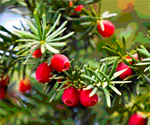 |
Extremely High |
Any part of the tree except for the berries (bark, leaves, etc) |
Trembling, weakness, stomach upset, difficulty breathing, incoordination, sudden death due to cardiac failure |
Death is very sudden – cows and horses can die from yew poisoning within 5 minutes. Signs can show up to two days later. |
Yew is extremely common and oftentimes is used as an ornamental shrub. Make sure to never leave clippings in your yard. |
| Cherry, Plum or Peach Trees |
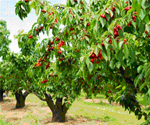 |
Extremely High |
Damaged leaves, pits and all other parts of the plant |
Respiratory problems, anxiety, collapse, staggering, sudden death |
Few minutes to about an hour for symptoms to set in and death to occur due to cyanide poisoning. |
Symptoms occur rapidly. If your pet is still alive 2-3 hours after ingesting the leaves or pits, they will usually survive, but it is always best to contact your vet. |
| Oleander |
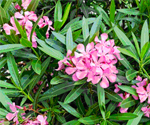 |
Extremely High |
The entire plant is toxic, fresh or dried and can kill even in small amounts |
Cardiac issues, stomach irritation, abdominal pain, vomiting, diarrhea, collapse, trembling, coma, death |
Signs develop quickly and can cause death with little to no warning. |
This plant is common in warm climates such as California, Arizona and Florida, as well as indoors. If you see your dog eating this plant, call your vet immediately. |
| Mushrooms |
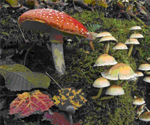 |
Extremely High, depending on the variety |
The entire mushroom is poisonous |
Symptoms can range from vomiting and bloody diarrhea to coma and death |
Symptoms develop 2-5 hours after your dog has ingested the mushroom, with death occurring 4-6 days after ingestion |
Make sure to comb your yard on a regular basis to make sure that no mushrooms have sprouted, especially in wetter climates. |
| Tulips |
 |
Moderate |
The bulb of the plant is the most toxic part |
Severe stomach irritation, central nervous system depression, cardiac abnormalities, convulsions, drooling, loss of appetite |
Symptoms will develop in a few hours. Usually, the dog will vomit out the toxins, unless it is a Lily of the Valley, in which vet attention is immediately required. |
If you have a pooch that enjoys digging, make sure there are no tulip or other plant bulbs available to him. |
| Tobacco |
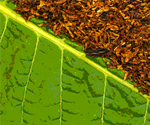 |
Low to Severe |
Any tobacco product is potentially lethal |
Vomiting, diarrhea, incoordination, collapse, respiratory difficulties, respiratory paralysis |
Smaller dogs are more affected than larger dogs. Call a vet as soon as possible. Symptoms typically occur 10-15 minutes after ingestion. |
Never allow your dogs to be near tobacco plants or products like canned chew and cigarettes. Make sure they do not have access to spit cups or ash trays either. |










